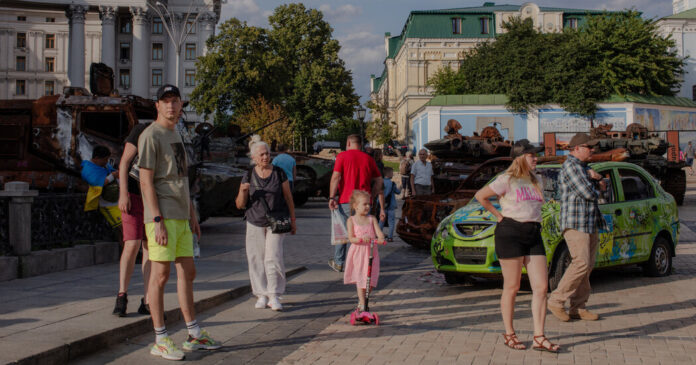I learned that every member of the American Embassy staff in Kyiv, led by our courageous and cleareyed ambassador, Bridget Brink, volunteered for the duty. They have been separated from their families and living for months on end in hotel rooms. They have the job of overseeing one of the largest U.S. assistance efforts since the Marshall Plan, ensuring that tens of thousands of individual pieces of American military hardware in Ukrainian hands are properly accounted for, reconstituting an embassy that was gutted on the eve of Russia’s invasion and keeping tabs on Russian war crimes — some 95,000 of which have been documented so far by the Ukrainian prosecutor general’s office.
I learned what it was like to sit in conference rooms and walk along corridors that would soon be shattered by Russian ordnance. On Tuesday, I joined a diplomatic group led by Administrator Samantha Power of the United States Agency for International Development on a visit to the port of Odesa. Power met first with Ukrainian officials to discuss logistical options for their exports after Putin’s withdrawal from the grain agreement, then with farmers to discuss issues like de-mining their fields and de-risking their finances. The stately Port Authority building in which the meetings took place, a purely civilian target, was struck barely a day after our departure.
I learned that Ukrainians have no interest in turning their victimization into an identity. Years ago, in Belgrade, I saw how the Serbian government had preserved the wreck of its old defense ministry, hit by NATO bombs in the 1999 Kosovo war, in keeping with its self-pitying perceptions of that war. By contrast, in Bucha, the Kyiv suburb that suffered some of the worst atrocities during Russia’s brief occupation in the early days of the war, I witnessed the transformation of apartment buildings dotted with patched-up bullet holes into trendy co-working spaces. As Anatoliy Fedoruk, the mayor of Bucha, told Power, “Memory will stay in memoirs but residents want to rebuild without reminders.”
I learned that Ukrainians aren’t likely to trade sovereign territory for Western security assurances, much less for some kind of armistice deal with Moscow. They tried the former in the 1990s with the Budapest Memorandum, in which they surrendered the nuclear arsenal on their soil to Russia for the sake of toothless guarantees of territorial integrity. They tried the latter with the equally toothless Minsk agreements after Russia’s first invasion in 2014. The goal of Western policy should be to provide Ukraine with the military means they need to win, rather than to pressure Ukraine into again bargaining away its rights to sovereignty and security for the sake of assuaging our anxieties about Russian escalation.
I learned that, for all the aid we’ve given Ukraine, we are the true beneficiaries in the relationship, and they the true benefactors. Ben Wallace, Britain’s usually thoughtful defense minister, suggested after this month’s NATO summit that Ukrainians should show more gratitude to their arms suppliers. That gets the relationship backward. NATO countries are paying for their long-term security in money, which is cheap, and munitions, which are replaceable. Ukrainians are counting their costs in lives and limbs lost.


